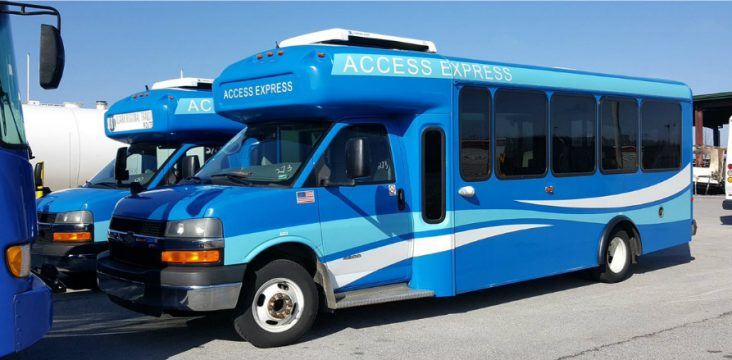ORT wants Creative Bus Sales to build buses with $3.6 million federal grant
by July 13, 2018 5:55 pm 847 views

Springdale-based transit provider Ozark Regional Transit will select Creative Bus Sales to build 12 buses with a $3.6 million federal grant the transit provider was awarded earlier this year. When the diesel-powered buses are added to the fleet, they would complete the replacement of the buses that were destroyed in an early 2017 fire, executive director Joel Gardner said.
Other companies that provided bids were Alexander Dennis, Alliance Bus Group and ENC RevGroup. ORT will choose Creative Bus Sales, which has a Springdale sales office, because it’s not only the low bidder, but it also can deliver the buses quickly.
While a good price was important, Gardner said, the production schedule was the determining factor. Creative Bus Sales can deliver new buses months ahead of some of the other companies that provided bids.
ORT plans to purchase a combination of 30-foot-long and 35-foot-long buses at an average cost of $350,000 each. On July 26, ORT board members will vote on whether to approve a contract with Creative Bus Sales before work can start. If approved, Gardner expects that the buses will be delivered by March 2019, allowing the provider to no longer have to operate with leased or borrowed buses.
Gardner recalled that shortly after the fire a colleague in Colorado said to not expect a resolution to come for two years. On Jan. 10, 2017, a blaze destroyed 20 buses and damaged two buses and two buildings at the transit provider’s headquarters. The two damaged buses have been restored, he said.
Earlier this year, the transit provider received eight new buses to begin replacing the destroyed buses. The buses ORT plans to purchase from Creative Bus Sales will have at least one-third more capacity than those. The new buses will seat between 29 and 37 people and include room for about 10 standing riders.
“They are true transit buses,” Gardner said, adding the seats can fold down to allow riders to bring on bicycles if the bicycle rack is full. Riders also won’t have to climb stairs or use a ramp because the first step into the bus is the bus floor.
Gardner had considered purchasing compressed natural gas (CNG) buses, but the time and money weren’t available. It would need to build a $2 million to $2.5 million CNG fueling facility on site, and each CNG bus costs between $30,000 and $40,000 more than diesel buses. The existing fleet’s two CNG buses are refueled at a fueling station about a mile from where the transit provider is based.
